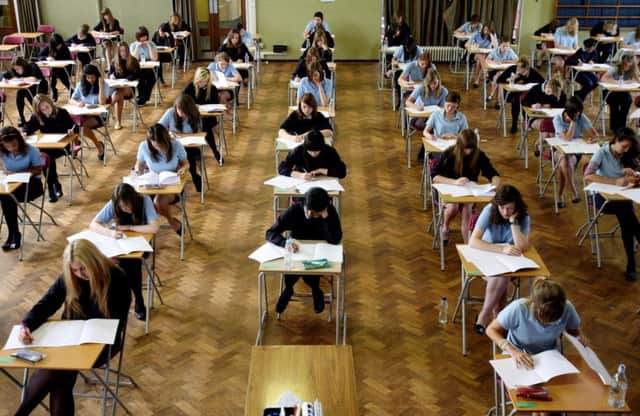More pupils taking traditional subjects, exams regulator reveals


There has a been a rise this summer in entries for subjects such as maths, English and science, which are seen as “good currency” by those sixth-formers seeking to study at an institution where competition for places is intense, according to Ofqual.
Chief regulator Glenys Stacey has also predicted that exam grades will be relatively stable this summer at both GCSE and A-level.
Advertisement
Hide AdAdvertisement
Hide AdIt follows controversy last year when reforms to exams and league tables were blamed for some schools seeing large drops in the number of pupils achieving the Government benchmark for GCSEs - five good grades including English and maths.
The government’s decision to only count a pupil’s first attempt in an exam in their school’s league table ranking, as well as the removal of the speaking and listening elements in English and moves toward a more linnear exam led were blamed for big changes in some schools’ results. At the time some teachers warned that these changes would adversely affect schools with a higher proportion of pupils on the C/D borderline.
However this year’s results are expected to see less volatility.
Government reforms to the exams system - such as the English Baccalaureate, which recognises students who gain at least a C at GCSE in English, maths, science, a language and history or geography - are said to be likely to be impacting on the subjects pupils are choosing to take, the regulator said.
Advertisement
Hide AdAdvertisement
Hide AdAt the same time, there has been a sharp drop in demand for other subjects, with entries for GCSE citizenship studies halving in the space of a year.
The figures come just a week before national A-level results are due to be published.
Ms Stacey said: “The subjects that are proving to be more popular this year are the traditional subjects. We have seen modest increases in the sciences and, I suppose, what Russell Group universities would call ‘facilitating subjects’.
“There’s been a drop-off in subjects that have never been high-volume subjects anyway, and there are one or two noticeable subjects that have dropped, for example GCSE citizenship studies where we’ve seen a 50 per cent drop in take-up.”
Advertisement
Hide AdAdvertisement
Hide AdThe drop-off in GCSE citizenship studies has been “quite exceptional”, Ms Stacey said. Another which has seen a fall is general studies, with entries down by a third at AS-level and a quarter at A-level. “Facilitating subjects” are those required most often by Russell Group universities, considered among the best institutions in the UK. They include English literature, maths, physics, biology, chemistry, geography, history and languages.
“We’ve seen this trend in recent years, it is noticeable this year, and I assume that is in response to some of the performance measures that we see,” Ms Stacey said.
She added: “Also there will no doubt be a good number of students who are thinking of their futures and where they wish to go in terms of higher education and recognising what universities might be looking for as well. So it’s an expected trend.” Entries for each of the three sciences - biology, chemistry and physics - have increased this year, while maths and further maths are also “noticeably more popular”, the regulator said.
Ms Stacey said that the reasons why these subjects are becoming more popular are not known. But she added: “We know that they are seen to be very good currency for some universities. If your aspirations are to study some subjects at universities where there is a great deal of competition for places, we know that maths is sometimes an absolute requirement for some places, and also is extremely well regarded. It’s not surprising that some students with those sort of ambitions will focus on that.”